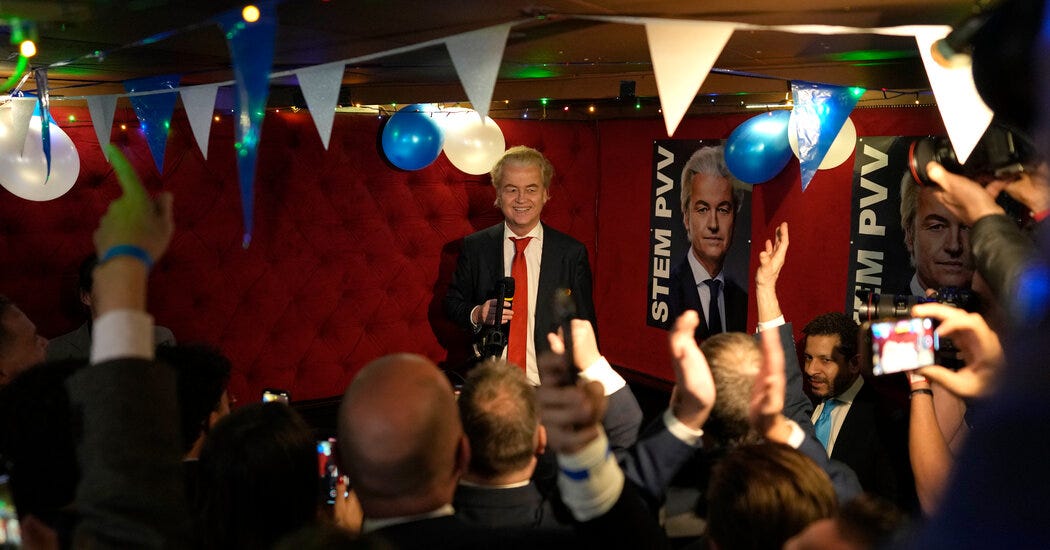Deconstructing The 2023 Dutch Elections
PVV's historic win signals that the European far-right is still alive and well.
Geert Wilders, 60, the hard-right veteran who leads the ardently anti-immigration party the PVV, looks set to win a historic victory as his party secured 37 seats in the 2023 Dutch election, doubling its results from the last election. It marks the first time a far-right populist party has become the largest in the Dutch parliament.
It’s difficult to understate how monumental this result is. While the PVV had been steadily rising in the polls ahead of the election, most had assumed that it would underperform, as it had in the past. In 2017, for instance, the PVV was predicted to win 42 seats, only to end up with 24. It was also assumed that with the threat of a far-right party emerging, left-wing and centrist voters would coalesce around the PvdA-GL to deny PVV the prestige of first place. Both of these assumptions failed to materialise.
Wilders experienced a late-minute surge mostly due to public discontent with high immigration levels, which reached a record high last year, with 400,000 new migrants entering the country. In his victory speech, Wilders vowed to tackle what he called the “asylum tsunami” hitting the Netherlands.
Followed closely behind this is Wilder’s stances on the cost of living crisis and health care, which are noticeably closer to the centre-left than some of the other right-wing parties. That orthodoxy of fusing left-wing economics and right-wing stances on social issues, copied to great success in Denmark and Slovakia, allowed him to capture a bigger portion of the Dutch electorate who were dissatisfied with the status quo of open borders and regressive austerity cuts to public services.
But, more importantly, PVV’s insurgence can be explained by a shifting mood in Dutch politics. Sarah de Lange, a politics professor at the University of Amsterdam, argued that another contributing factor behind the PVV’s surge was how mainstream parties, like the VVD and NSC, “legitimized Wilders” by making immigration a key issue. “Voters might have thought that if that is the issue at stake, why not vote for the original rather than the copy?”
Once considered a political pariah for its extreme views on immigration, Islam and crime, over the years, as more Dutch voters shifted to the political right, the PVV’s image became rehabilitated. It was seen as less extreme, especially with the emergence of parties further to the right, such as the FvD and JA21, which made the PVV appear less extreme in comparison.
Now, as the largest party in the Dutch parliament, the impetus falls on the PVV to lead negotiations towards forming the next government.
Since the exit polls were announced, potential centre-right partners have not ruled out forming a coalition with Wilders, despite the fact that for the past 10 years, he’s been kept out of government by a so-called cordon-sanitare. But, just like with other European countries, that opposition seems to be dissolving.
Dilan Yeşilgöz, the country’s Justice Minister and leader of the VVD, indicated early in the campaign that she could potentially enter coalition talks with Wilders, a call reiterated Wednesday night. Peter Omtigizt, leader of the fourth-largest party, the NSC, also vaguely claimed that he could work with Wilders and the PVV, so long as there were compromises made to close the gulf between the parties.
Wilders has already signalled that he is willing to compromise with other parties and drop or dilute some of his more extreme measures, reflected by his softened stances on Islam and the EU. If he is genuinely serious, then the manifesto pledge first on the chopping block will undoubtedly be his desire to hold a referendum on the Netherlands’ membership in the EU. Despite its lurch to the right in recent years, Dutch voters broadly support retaining membership of the EU, with a 2022 poll finding that 75% would vote to remain in a hypothetical ‘Nexit’ referendum. Another policy most likely to be dropped is the banning of mosques, which is not only opposed by most political parties but also constitutionally impossible because of the Netherlands’ strong safeguarding of religious freedom.
The ramifications of Wilders’ win will not just be contained to the Netherlands; it will reverberate across the continent, signalling to European leaders that claims of the far-right’s demise were premature. Marine Le Pen, leader of the National Rally in France, congratulated Wilders, a friend of hers, claiming that his victory illustrated how “more and more countries within the European Union are contesting the way it works.” This level of jubilation was mirrored by Viktor Orban, current prime minister of Hungary, who wrote on Twitter that, “the winds of change are here!”
The road ahead for Wilders is fraught with hurdles and obstacles. Forming a government will not be easy, but it looks increasingly likely that the Dutch far-right is the closest it’s ever been to securing power.


